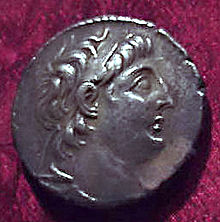Antiochus VII Sidetes
| Antiochus VII Euergetes | |
|---|---|
| Antiochus VII Sidetes | |
 |
|
| King of the Seleucid Empire (King of Syria) | |
| Reign | 138–129 BC |
| Predecessor | Diodotus Tryphon |
| Successor |
Alexander II Zabinas (false son) Demetrius II Nicator (elder brother) |
| Born | Unknown |
| Died | 129 BC Ecbatana, Iran during the Battle of Ecbatana |
| Consort | Cleopatra Thea |
| Issue | Antiochus IX Cyzicenus |
| Dynasty | Seleucid dynasty |
| Father | Demetrius I Soter |
| Mother | possibly Laodice V |
Antiochus VII Euergetes, nicknamed Sidetes (from Side, a city in Asia Minor), ruler of the Hellenistic Seleucid Empire, reigned from 138 to 129 BC. He was the last Seleucid king of any stature. After Antiochus VII Sidetes was killed in battle, the Seleucid realm was restricted to Syria.
He was one of the sons of Demetrius I Soter, the brother of Demetrius II Nicator and his mother may have been Laodice V. Antiochus was elevated after Demetrius' capture by the Parthians. He married Cleopatra Thea, who had been the wife of Demetrius. Their offspring was Antiochus IX, who thus became both half-brother and cousin to Seleucus V and Antiochus VIII.
Sidetes defeated the usurper Tryphon at Dora and laid siege to Jerusalem in 132. During the siege he allowed a seven-day truce for the Jews to celebrate a religious festival, impressing the Jewish leadership. According to Josephus the Hasmonean leader John Hyrcanus opened King David's sepulchre and removed three thousand talents, which he then paid Antiochus to spare the city. Nevertheless, King Antiochus' respectful treatment of the Jews, and respect for their religion, earned him their gratitude and added name, Euergetes ("the Benefactor"). With no Jewish sources of that time (the Book of Maccabees ends few years before his time) it is unclear if the siege of Jerusalem ended with a decisive Seleucid victory or simply a peace treaty. Furthermore, the fact is that Jewish forces later assisted Sidetes in his wars, and that for nearly 20 years after his death, John Hyrcanus refrained of attacking areas under Seleucid control. All in all it indicates a renewal of the friendly relations from the time of Demetrius II.
...
Wikipedia
